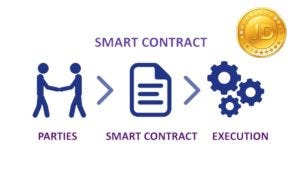A Smart contract is a computer program or a transaction protocol which automatically executes, control or document legally relevant events or actions according to the terms of a contract/program.
This system of automatic execution allows complex transactions to get executed between two parties without requiring an intermediary, any central authority, legal guidance, or an enforcement system. These also helps to solve the issue of mistrust between parties and business partners.
Smart contracts enable variety of advantages for a good range of industries, reducing unnecessary costs and time expenditure while enhancing transparency. Smart contracts give autonomy, trust, backup with complete safety. The accuracy is not at all compromised with faster speed in completion of task, in fact, it enables savings. The benefits of smart contracts are most apparent in business collaborations wherein it brings simplicity and efficiency to every financial transaction.

Smart contract has use cases that can be found all kinds of situations starting from banking, insurance, energy, e-government, telecommunications, music industry, art, mobility, education, and many more i.e. these may range from simple to complex.
On a blockchain, these streamline the complex process that involves several intermediaries because of a lack of trust among participants in the transaction. Essentially, Smart Contracts use cases can allow for a wide variety of actions.
Let’s examine few real examples of smart contract applications:
- The Healthcare Industry: Smart contracts frequently helps with patient privacy and data conservation. This new technology reduces the high transaction costs while improving compliances and protocols. It gives a safe network of access to a secure, transparent record of their health data from patients to health practitioners.
- Peer-to-Peer Transactions: Smart contracts can be used for a whole range of peer-to-peer transactions and the possibilities are endless here. These have been used for everything from launching ICO‘s to selling goods on the internet.
- Insurance: There are a large number of claim settlement coming in the insurance industry on a daily basis and smart contracts improves and fasten the claim processing in many ways. The insurance company or an individual can easily put an error check and determine payout amounts based on a set of criteria. Critical Information such as driver licenses, driving records, accident reports, and policy details could be immediately processed to facilitate speedy payouts that would benefit both parties.
Insurance companies have to make these complex contracts for its policy users, smart contracts help in making such crucial contracts and further executing them.
- Property/real estates: While buying and selling a house or property, there are many people and professional services involved which further adds to the cost to the seller and buyer. They have to pay to the real estate companies, agents, and lawyers to draw out contracts and get the whole procedure done. This process ends up consuming up to five to ten percent of the cost of the property to be paid in commissions. Property ownership related contracts can be recorded with this cost-effective and faster technology of smart contracts. A smart contract is a direct contract between two parties based on trust. There is no need for intermediaries if there is trust.
The expensive services delivered by lawyers and brokers can be avoided as the sellers can handle the transactions completely by themselves.
- Finance Trading: The sector of trade was immensely benefitted with the introduction of smart contracts. The labor-intensive chores like heavy calculations and workflow approvals are much automated now, thereby, reducing the work-hours and errors to take place.
Conclusion:
Smart contracts are one of the exciting innovations of Blockchain technology. The application of smart contracts can revolutionize the way we live our lives. The transaction times will be even speedier at lower costs and even make processes much easier and stress-free.




